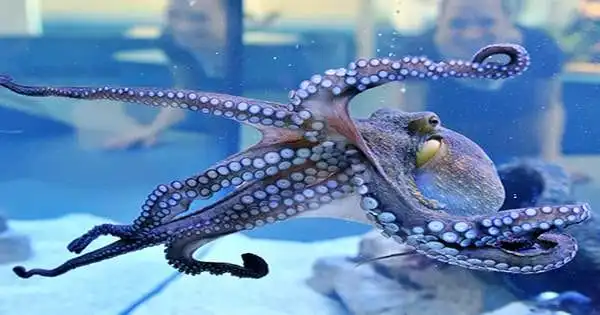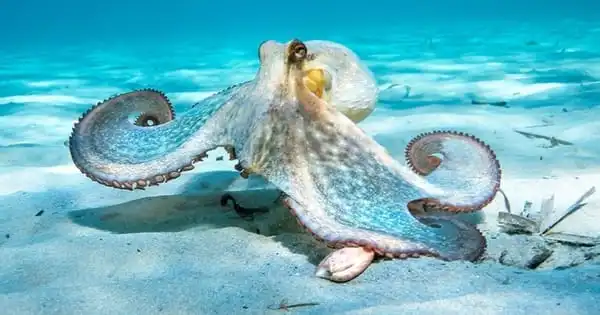Octopuses can solve complicated puzzles and exhibit preferences for different persons, but whether they, and other animals and invertebrates, have emotions is a passionately discussed topic that, according to a York University expert in animal minds, might shake up humans’ moral decision-making.
Most countries do not recognize invertebrates like octopuses, crabs, lobsters, and crayfish as sentient animals capable of feeling pain, however, the United Kingdom is considering amending its animal welfare regulations to do so.
Once upon a time, the issue of whether crabs or squids have feelings would have seemed absurd. Squid and crabs do not have feelings like dogs and cats. Right? However, it has become clear in recent decades that there is no simple evolutionary road to “smartness.” What about the ability to feel pain or emotion in the same way that a dog or cat would?
While vertebrates are known to be capable of experiencing both physical and emotional pain, it is unclear whether invertebrates, which have much simpler neural systems, are capable of something similar. Octopuses are the most neurologically complex invertebrates on the planet, yet surprisingly few studies have focused on their ability to feel pain.
When we go about our daily lives, we try not to damage other beings. So it’s essentially a matter of retraining our perceptions of the world. The precise treatment of other animals is still an open research subject. We don’t have enough science right now to know how specific species should be treated. More collaboration between scientists and ethicists is required to discover this.
Professor Kristin Andrews
“A London School of Economics (LSE) report commissioned by the UK government found there is strong enough evidence to conclude that decapod crustaceans and cephalopod molluscs are sentient,” says Kristin Andrews, York University Professor and philosopher and York Research Chair in Animal Minds, who is working with the LSE team.
Andrews co-wrote “The Question of Animal Emotions,” an essay published in the journal Science, with Professor Frans de Waal, head of Emory University’s Living Links Center, that addresses the ethical and policy difficulties surrounding the classification of animals as sentient.
According to Andrews, it has long been assumed in Western culture that other animals do not feel pain or have feelings. “Even getting fish and mammals recognized as sentient under welfare law has been difficult. So what appears to be happening with invertebrates in the United Kingdom is quite cutting-edge.”
Pre-verbal human babies were thought to be painless until at least the 1980s. Many people believe that animals, particularly invertebrates, do not sense pain and simply react subconsciously to unfavorable stimuli. However, studies on mammals, fish, octopuses, and, to a lesser extent, crabs have demonstrated that they avoid discomfort and risky environments, and there are hints of empathy in some animals, such as cows, who become worried when their calf is in pain.

Recognizing invertebrate sentience raises a moral and ethical quandary. Humans can express their feelings, but animals do not have the same tools. “However, the data thus far clearly implies their presence,” adds Andrews, who is working on a project called Animals and Moral Practice.
“When we go about our daily lives, we try not to damage other beings. So it’s essentially a matter of retraining our perceptions of the world. The precise treatment of other animals is still an open research subject “says Andrews “We don’t have enough science right now to know how specific species should be treated. More collaboration between scientists and ethicists is required to discover this.”
There may come a time when humans will no longer be able to believe that crayfish, shrimp, and other invertebrates do not experience pain or other emotions.
Some scholars believe that because a shell lessens the requirement for intelligence, the octopus got more intelligent as a result of losing its shell. Others are not convinced. The problem, they believe, is that the octopus would have needed to gain intelligence 275 million years ago before losing its shell. It would have been devoured to extinction otherwise. But what was the impetus for intelligence in that case? In any case, shelly crabs and lobsters exhibit surprising intellect.
The practical concern is whether the seafood sector can continue to overlook the likelihood that their catch suffers from pain. They may need to adjust their harvesting methods, as the British are considering.
“Invertebrate experiences will need to become part of our species’ moral landscape if they can no longer be deemed immune to felt anguish,” she argues. “However, pain is only one morally significant emotion. Other feelings that invertebrates, such as octopuses, may experience include interest in exploration, fondness for individuals, and excitement in expectation of a future reward.”
It might be time to take a fresh look at our world.





